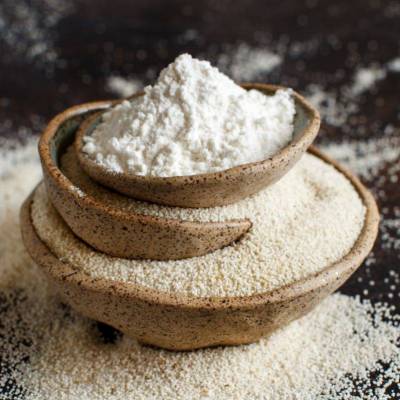Introduction
Almond flour is gaining popularity as a healthy substitute for traditional wheat flour . And for good reason!
Here's an article to guide you through everything you need to know about almond flour, from its nutritional composition to its many culinary applications to its health benefits in various diets.
At the end of the article, we have written an FAQ that may answer the questions you have!
What is Almond Flour?
Origin and Composition
Almond flour is made from ground almonds. The almonds are first blanched to remove the skin and then ground into a fine powder. This production method retains most of the nutrients in the almonds.
Nutritional Profile
Rich in protein, vitamin E, magnesium, and fiber, it is a nutritious choice for everyone. It is also low in carbohydrates and gluten-free, making it ideal for many special diets.
Properties and Characteristics
Low Carb and Gluten Free
Its low carbohydrate content and absence of gluten make it perfectly suited to people following a low carbohydrate, keto diet, or with gluten sensitivities.
Rich in Essential Nutrients
It is a source of healthy fats, especially monounsaturated fatty acids, and contains antioxidants, contributing to better cardiovascular and skin health.
Uses in the Kitchen
Versatile Uses in Baking
In baking, it can replace wheat flour in cakes, muffins, and cookies, providing a rich and moist texture.
Alternative for Breadings
It also serves as a crispy coating for meat or vegetable dishes.
Thickener in Sauces
Its ability to thicken without weighing it down makes it an excellent choice for sauces and soups.
Interests in a Low GI, Keto or Low Carb Diet
Ideal for Low GI Diets
It helps maintain stable blood sugar levels, which is crucial for low glycemic index diets.
A Pillar of the Keto Diet
In the keto diet, almond flour helps to prepare delicious meals while respecting the required macro-nutrient ratios.
Supplement for a Low Carb Diet
It offers a tasty and nutritious alternative to reduce carbohydrate intake.
Health Benefits
Cardiovascular Benefits
The healthy fats and fiber found in almond flour may contribute to better cardiovascular health.
Weight Management and Satiety
Its high protein and fiber content promotes satiety, thus helping with weight management.
Skin Health Support
Vitamin E, a powerful antioxidant, helps protect the skin against free radical damage.
Conclusion
Almond flour is a staple in a healthy, balanced diet. With its many nutritional benefits, versatility in the kitchen, and compatibility with various diets, it's a great choice for those looking to eat healthy while still enjoying themselves.
FAQ
Q: Is almond flour suitable for vegan or paleo diets?
A: Yes, almond flour is a great option for those following a vegan or paleo diet because it is naturally dairy-free, gluten-free, and grain-free.
Q: Can almond flour completely replace wheat flour in all recipes?
A: While it is versatile, almond flour does not have the same properties as wheat flour, especially in terms of rising. It works best in recipes that do not require an airy texture.
Q: Is almond flour healthy?
A: Yes, it is rich in essential nutrients and can contribute to a healthy diet, especially for those following a low-carb or gluten-free diet.
Q: Where can I find quality, cheap almond flour?
Here you will find Délices Low Carb almond flour with an excellent quality-price ratio.
Q: Can almond flour be replaced with coconut flour?
Yes, but not in the same proportions. Coconut flour is more absorbent and requires adjustments in the quantities of flour and liquid ingredients.
Q: Is almond flour gluten free?
Yes, almond flour is naturally gluten-free and is a great alternative for those with celiac disease or wheat intolerance. However, it is important to check the packaging to ensure it is not contaminated with gluten during the manufacturing process.
Q: Can almond flour help lower LDL cholesterol and blood pressure?
Yes, the nutrients in almond flour may help lower LDL cholesterol and lower blood pressure, although current research is mixed and requires further study to establish a definitive link.
Q: How to use almond flour in baking and cooking?
Almond flour can be substituted for wheat flour in a 1:1 ratio in most baking recipes. It can also be used as a breading for meats.





Comments (0)
There are no comments for this article. Be the first one to leave a message!